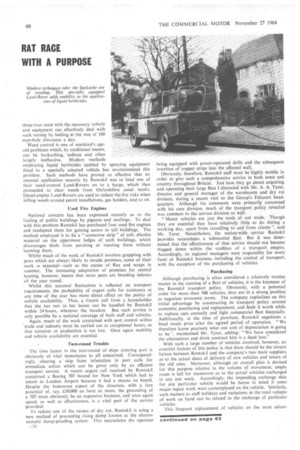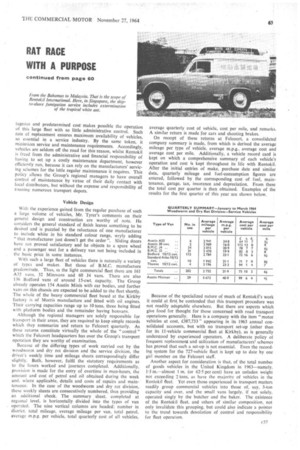RAT RACE WITH A PURPOSE
Page 62

Page 65

If you've noticed an error in this article please click here to report it so we can fix it.
three-man team with the necessary vehicle and equipment can effectively deal with such vermin by baiting at the rate of 100 man-hole entrances a day.
Weed control is one of mankind's ageold problems which, by traditional means, can be backaching, tedious and often largely ineffective. Modern methods employing liquid herbicides applied by spraying equipment fitted to a specially adapted vehicle has revolutionized this problem. Such methods have proved so effective that an unusual application recently by Rentokil was to load one of their weed-control Land-Rovers on to a barge, which then proceeded to clear weeds from Oxfordshire canal banks. Diesel-engine Land-Rovers are used to reduce the fire risks when killing weeds around petrol installations, gas holders, and so on.
Used Fire Engines National concern has been expressed recently as to the fouling of public buildings by pigeons and starlings. To deal with this problem Rentokil has purchased four used fire engines and readapted them for gaining access to tall buildings. The method employed is to fix a "scarecrow strip" of soft, plastics material on the uppermost ledges of such buildings, which discourages birds from perching or roosting there without harming them.
Whilst much of the work of Rentokil involves grappling with pests which are always likely to invade premises, some of their work is seasonal—such as the excess of flies and wasps in summer. The increasing adaptation of premises for central heating, however, means that more pests are breeding indoors all the year round.
Whilst this seasonal fluctuation is reflected on transport requirements, the probability of urgent calls for assistance at any time of the year has more direct effect on the policy of vehicle availability. Thus, a frantic call from a householder that she has rats in her house can be handled by Rentokil within 24 hours, wherever the location. But_ such service is only possible by a national coverage of both staff and vehicles. Again, much of the work concerned with pest control within 'trade and industry must be carried out at exceptional hours, so that turnover or production is not lost. Once again mobility and vehicle availability are essential.
Turn-round Trouble
The time factor in the turn-round of ships entering port is obviously ot vital importance to all concerned. Correspondingly, clearing a ship from infestation in port calls for immediate action which can be given only by an efficient transport service. A recent urgent call received by Rentokil concerned a Boeing 707 bound for New York which had to return to London Airport because it had a mouse on board. Despite the humorous aspect of the situation, with a fare potential of. say, £10,000 an hour or more, the grounding of a 707 must obviously be an expensive business, and once again speed, as well as effectiveness, is a vital part of the service provided.
To reduce one of the causes of dry rot, Rentokil is using a new method of preventing rising damp known as the electroosmotic damp-proofing system. This necessitates the operator 34 being equipped with power-operated drills and the subsequent insertion of copper strips into the affected wall.
Obviously, therefore, Rentokil staff must be highly mobile in order to give such a comprehensive service in both town and country throughout Britain. Just how they go about acquiring and operating their large fleet I discussed with Mr. A. A. Tyrer, director and general manager of the woodworm and dry rot division, during a recent visit to theGroup's Felcourt headquarters. Although his comments were primarily' concerned with his own division, much of the transport policy revealed was common to the service division as well.
"Motor vehicles are just the tools of our trade. Though they are essential they have relatively little to do during a working day, apart from travelling to and from clients", said Mr. Tyrer. Nevertheless, the nation-wide service Rentokil provides necessitates a substantial fleet. But it was determined that the effectiveness of that service should not become bogged down within the confines of a transport empire. Accordingly, its regional managers were responsible for every facet of Rentokil business, including the control of transport, with the exception of the purchasing of vehicles.
Purchasing
Although purchasing is often considered a relatively routine matter in the running of a fleet of vehicles, it is the keystone of the Rentokil transport policy. Obviously, with a potential order for more than 700 vehicles, they are in a strong position to negotiate economic terms. The company capitalizes on this initial advantage by constructing its transport policy around economic, purchasing and replacement, and finds it worth while to replace cars annually and light commercial fleet biennially. Additionally, at the time of purchase, Rentokil negotiates a fixed resale price after the agreed period of operation. "We therefore know precisely what our cost of depreciation is going to be ", maintained Mr. Tyrer, adding: "We have considered the alternatives and think contract hire is a dead loss."
With such a large number of vehicles involved, however, an essential feature of this policy is that there should be the closest liaison between Rentokil and the company's two main suppliers as to the actual dates of delivery of new vehicles and return of the old ones. Moreover, although an overall plan is devised for this purpose relative to the volume of movement, ample room is left for manceuvre as to the actual vehicles exchanged in any one week. Accordingly, the impending exchange date for any particular vehicle would be borne in mind if some major repair work were contemplated on the vehicle. Similarly, such matters as staff holidays and variations in the total volume of work on hand can be related to the exchange of particular vehicles.
This frequent replacement of vehicles on the most advan
tageous and predetermined cost makes possible the operation of this large fleet with so little administrative control. Such rate of replacement ensures maximum availability of vehicles, so essential in a service industry. By the same token, it minimizes service and maintenance requirements. Accordingly, vehicles are seldom off the road for this reason, whilst Rentokil is freed from the administrative and financial responsibility of having to set up a costly maintenance department, however efficiently run, because it can rely on the manufacturers' servicing schemes for the little regular maintenance it requires. This policy allows the Group's regional managers to have overall control of maintenance by virtue of their daily contact with local distributors, but without the expense and responsibility of running numerous transport depots.
With the experience gained from the regular purchase of such a large volume of vehicles, Mr. Tyrer's comments on their general design and construction are worthy of note. He considers the general standard of finish leaves something to be desired and is puzzled by the reluctance of one manufacturer to include white in his standard colour range, wryly adding "that manufacturer just doesn't get the order ". Sliding doors have not proved satisfactory and he objects to a spare wheel and a passenger seat for a delivery van not being included in the basic price in some instances.
With such a large fleet of vehicles there is naturally a variety of types and makes. But those of B.M.C. manufacture predominate. Thus, in the light commercial fleet there are 161 A35 vans, 32 Minivans and 60 J4 vans. There are also 136 Bedford vans of around 15-cwt. capacity. The Group already operates 154 Austin Minis with car bodies, and further vans on this chassis are expected to be added to the fleet shortly. The whole of the heavy commercial fleet based at the Kirkby factory is of Morris manufacture and fitted with oil engines. Their carrying capacities range up to 10 tons, three being fitted with platform bodies and the remainder having boxyans.
Although the regional managers are solely responsible for transport in their areas, they are required to keep simple records which they summarize and return to Felcourt quarterly. As these returns constitute virtually the whole of the " control " which the Felcourt headquarters has over the Group's transport operation they are worthy of examination.
Because of the differing types of work carried out by the woodworm and dry rot division and the service division, the driver's weekly time and mileage sheets correspondingly differ slightly. Both, however, fulfil the statutory requirements as to the hours worked and journeys completed. Additionally, provision is made for the entry of overtime in man-hours, the amount and cost of petrol and oil obtained during the week and, where applicable, details and costs of repairs and maintenance. In the case of the woodworm and dry rot division, these weekly sheets are consecutively numbered, thus providing an additional check. The summary sheet, completed at regional level, is horizontally divided into the types of van operated. The nine vertical columns are beaded: number in district, total mileage, average mileage per van, total petrol, average m.p.g. per vehicle, total quarterly cost of all vehicles,
average quarterly cost of vehicle, cost per mile, and remark. A similar return is made for cars and shooting brakes.
On receipt of these returns at Felcourt, a consolidated company summary is made, from which is derived the average mileage per type of vehicle, average m.p.g., average cost and average cost per mile. Additionally, a vehicle record card is kept on which a comprehensive summary of each vehicle's operation and cost is kept throughout its life with Rentokil. After the initial entries of make, purchase date and similar data, quarterly mileage and fuel-consumption figures are entered, followed by the corresponding cost of fuel, maintenance, garage, tax, insurance and depreciation. From these the total cost per quarter is then obtained. Examples of the results for the first quarter of this year are shown below.
Because of the specialized nature of much of Rentokil's work it could at first, be contended that this transport procedure was not readily adaptable elsewhere. But there are aspects which give food for thought for those concerned with road transport operations generally. Here is a company with the item "motor vehicles at cost, £387,733" appearing in its 1963 annual consolidated accounts, but with no transport set-up ,(other than for its 11-vehicle commercial fleet at Kirkby), as is generally understood by experienced operators. A deliberate policy of frequent replacement and utilization of manufacturers.' schemes has proved that such a set-up is not essential. Even the recording system for the 727-vehicle fleet is kept up to date by one girl member on the Felcourt staff.
Another aspect for consideration is that, of the total numbet of goods vehicles in the United Kingdom in 1963—namely, 1-5 m.—almost 1 m. (or 62-5 per cent) have an unladen weight not exceeding 2 tons, as have the majority of vehicles in the Rentokil fleet. Yet even those experienced in transport matters readily group commercial vehicles into those of, say, 3-ton capacity and over, and the small vans largely, if not solely, operated singly by the butcher and the baker. The existence of the Rentokil fleet, and others of similar composition, not only invalidate this grouping, but could also indicate a pointer to the trend towards devolution of control and responsibility for fleet operation.
















































































































